Female Soldiers' Custody Battles
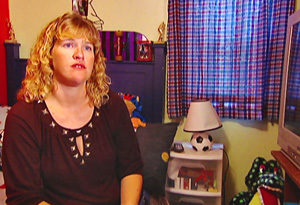
When you choose to serve in the military, it's understood that you may have to make sacrifices—some big and some small. But would you be willing to sacrifice custody of your children?
Many civilians don't know that women in the military can lose custody while they're overseas. This harsh reality is something divorced military mothers must deal with while fighting to stay alive.
Tanya, a sergeant in the National Guard and single mother to two boys, is one of those soldiers. "His father and I split when [my oldest son] was very young, so it was just him and I for a long time," she says. "We have a very close bond."
When her son was 5 years old, Tanya remarried and gave birth to another son. "Our life was complete," she says.
Then, after 11 years of National Guard service, Tanya was deployed to Iraq. "It was very emotional to know that you're going to leave and miss crucial points in your child's life," she says.
When she received her orders, Tanya says she made arrangements for both of her sons to stay with her husband, but her ex-husband didn't agree with that arrangement. He wanted his son to live with him while Tanya was overseas, so he filed a petition for temporary custody.
A judge ruled that Tanya's older son should temporarily live with his father. "One thing that gave me a little peace of mind was knowing that when I came home, he was going to come back home also," Tanya says. "Then, about a week before I was to come back home, I found out that might not happen."
Many civilians don't know that women in the military can lose custody while they're overseas. This harsh reality is something divorced military mothers must deal with while fighting to stay alive.
Tanya, a sergeant in the National Guard and single mother to two boys, is one of those soldiers. "His father and I split when [my oldest son] was very young, so it was just him and I for a long time," she says. "We have a very close bond."
When her son was 5 years old, Tanya remarried and gave birth to another son. "Our life was complete," she says.
Then, after 11 years of National Guard service, Tanya was deployed to Iraq. "It was very emotional to know that you're going to leave and miss crucial points in your child's life," she says.
When she received her orders, Tanya says she made arrangements for both of her sons to stay with her husband, but her ex-husband didn't agree with that arrangement. He wanted his son to live with him while Tanya was overseas, so he filed a petition for temporary custody.
A judge ruled that Tanya's older son should temporarily live with his father. "One thing that gave me a little peace of mind was knowing that when I came home, he was going to come back home also," Tanya says. "Then, about a week before I was to come back home, I found out that might not happen."
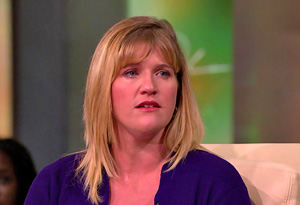
While in Iraq, Tanya received an email from her lawyer saying her ex-husband was suing her for custody of their now 8-year-old son. "It was like someone ripping my heart out," she says. "If I had known what me going over to Iraq was going to do to my family, I would have done everything that I could have to try to get out of a deployment."
Before Tanya could get home, the judge made a decision. The court ruled that both Tanya and her ex-husband were good parents, but because Tanya's son had been living with his father for the past 18 months, the judge thought it was in his best interest to continue living with his father. Today, Tanya and her ex-husband share joint custody of their son—now 15 years old—but her ex-husband has physical custody.
Tanya says the only way she could have stayed home with her children is if she had dishonorably discharged herself. "But I didn't think that I needed to do that," she says. "I was serving my country. I didn't think I was going to be penalized."
Before Tanya could get home, the judge made a decision. The court ruled that both Tanya and her ex-husband were good parents, but because Tanya's son had been living with his father for the past 18 months, the judge thought it was in his best interest to continue living with his father. Today, Tanya and her ex-husband share joint custody of their son—now 15 years old—but her ex-husband has physical custody.
Tanya says the only way she could have stayed home with her children is if she had dishonorably discharged herself. "But I didn't think that I needed to do that," she says. "I was serving my country. I didn't think I was going to be penalized."
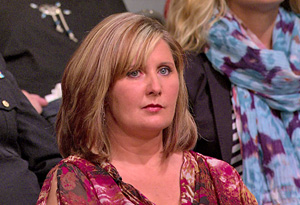
Capt. Eva Slusher, a woman who served in the Army National Guard, once faced the same battle as Tanya. After Eva returned home from a 15-month deployment, she says her ex-husband refused to return their daughter, Sara, without a court order.
When Eva went to court, she says the hearing turned into a full-blown custody battle. "The judge ruled that, just like in Tanya's case, we're both good parents," Eva says. "But because of my deployment and Sara being in her father's home for that amount of time, she was better off there because, 'the military lifestyle is not stable and is not conducive to raising children.'"
Eva's fight waged on for years. She appealed the ruling in the Court of Appeals, the Appellate Court and, finally, in the State Supreme Court. "She was 9 when I left," Eva says. "She was 12 when I got her back."
When Eva went to court, she says the hearing turned into a full-blown custody battle. "The judge ruled that, just like in Tanya's case, we're both good parents," Eva says. "But because of my deployment and Sara being in her father's home for that amount of time, she was better off there because, 'the military lifestyle is not stable and is not conducive to raising children.'"
Eva's fight waged on for years. She appealed the ruling in the Court of Appeals, the Appellate Court and, finally, in the State Supreme Court. "She was 9 when I left," Eva says. "She was 12 when I got her back."

To help protect military mothers like herself, Eva set out to change the laws in her home state of Kentucky. "I was floored because I really thought I would be protected. The Service Member Civil Relief Act protects us from our employers. If I get deployed and I come back, my employer has to give me my job back," she says. "They also protect our cell phone contracts ... but not our children."
Eva took action by aligning herself with the National Guard Association and legislation consultants who helped her draft a resolution. A state senator picked it up, and eventually, a law that protects military parents' rights in custody hearings passed.
This was a triumph for soldiers in Kentucky, but some states don't offer the same protection. "I did assist four other states in getting their laws changed," Eva says. "To date, there are 36 states that have changed their laws."
Eva took action by aligning herself with the National Guard Association and legislation consultants who helped her draft a resolution. A state senator picked it up, and eventually, a law that protects military parents' rights in custody hearings passed.
This was a triumph for soldiers in Kentucky, but some states don't offer the same protection. "I did assist four other states in getting their laws changed," Eva says. "To date, there are 36 states that have changed their laws."
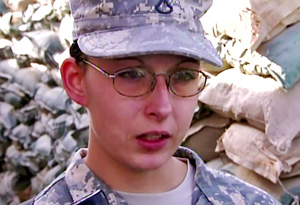
Pvt. 1st Class Margaret Parish and Spc. Jasmine Williams, two soldiers currently stationed at Bagram Airfield in Afghanistan, are in the midst of their own custody battles.
When Margaret, a 27-year-old mother of three, left for Afghanistan in February 2010, she says her marriage was on the rocks. "I was going to do everything I could to make it work," she says.
But, a few months into Margaret's deployment, her husband told her it was over. "He just came out and said, 'You know, I can't do it if you're going to be gone all the time,'" she says. "'You've abandoned your family. You know, I'm done.' I was hurt. It was like a big slap in the face."
Margaret's husband is now seeking full custody of their three children, who range in age from 18 months to 5 years old. Thousands of miles away, Margaret says she feels helpless. "The only thing I can do is just let it ride," she says. "I have really no other choice but to give him custody. Then, when I get home, I've got to start from scratch. I've got to figure out what I've got to do and go for custody."
No matter how hard this situation is, Margaret feels good about her decision to be in the military. "It's difficult being away from your children anytime," she says. "But I seriously think this is one of the better choices I've made in my life."
When Margaret, a 27-year-old mother of three, left for Afghanistan in February 2010, she says her marriage was on the rocks. "I was going to do everything I could to make it work," she says.
But, a few months into Margaret's deployment, her husband told her it was over. "He just came out and said, 'You know, I can't do it if you're going to be gone all the time,'" she says. "'You've abandoned your family. You know, I'm done.' I was hurt. It was like a big slap in the face."
Margaret's husband is now seeking full custody of their three children, who range in age from 18 months to 5 years old. Thousands of miles away, Margaret says she feels helpless. "The only thing I can do is just let it ride," she says. "I have really no other choice but to give him custody. Then, when I get home, I've got to start from scratch. I've got to figure out what I've got to do and go for custody."
No matter how hard this situation is, Margaret feels good about her decision to be in the military. "It's difficult being away from your children anytime," she says. "But I seriously think this is one of the better choices I've made in my life."
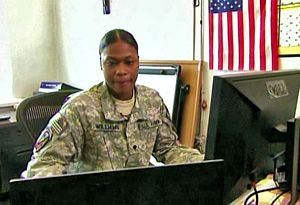
During her tour of duty in Afghanistan, Jasmine Williams says her unit has been attacked and bombed, but even in the heat of battle, she never stops thinking about her baby daughter.
"All the while, I'm thinking, 'What's my baby doing?'" Jasmine says. "'Am I going to make it home to my daughter? When am I going to pick her up?'"
To add to the stress of war and motherhood, Jasmine is also going through a divorce. When she returns home, she says she'll have to start a new life...but she hopes her sacrifices pay off. "I know that this sacrifice that I'm making now is going to better my daughter's future," she says. "Sometimes, as a mother, you just have to sacrifice and do what you have to do to support your kids."
"All the while, I'm thinking, 'What's my baby doing?'" Jasmine says. "'Am I going to make it home to my daughter? When am I going to pick her up?'"
To add to the stress of war and motherhood, Jasmine is also going through a divorce. When she returns home, she says she'll have to start a new life...but she hopes her sacrifices pay off. "I know that this sacrifice that I'm making now is going to better my daughter's future," she says. "Sometimes, as a mother, you just have to sacrifice and do what you have to do to support your kids."
Please note that Harpo Productions, Inc., OWN: Oprah Winfrey Network, Discovery Communications LLC and their affiliated companies and entities have no affiliation with and do not endorse those entities or websites referenced above, which are provided solely as a courtesy. Please conduct your own independent investigation (including an investigation as to whether any contributions are tax deductible) before donating to any charity, project or organization. This information is provided for your reference only.



